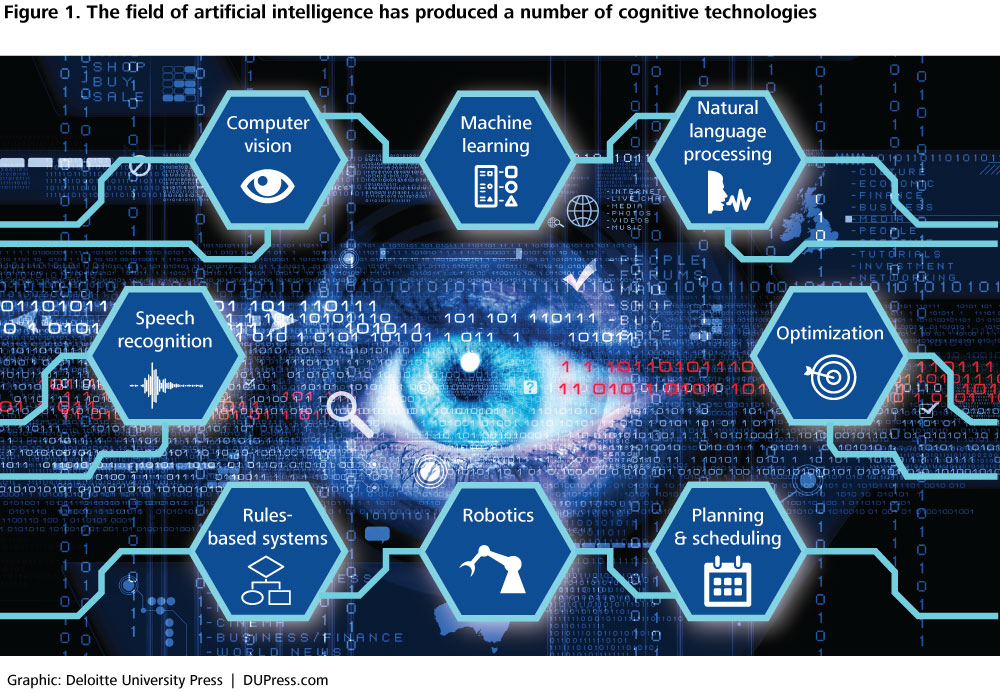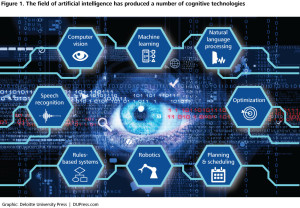Cognitive computing is the simulation of human thought processes in a computerized model – it involves self-learning systems that use data mining, pattern recognition and natural language processing to try and imitate the way the human brain works. Companies such as IBM among others are finding increasing uses of cognitive technology in software enterprise – a trend likely to disrupt the enterprise world in 2016.
Manoj Saxena, former leader of IBM Watson’s software division attributes the rise of cognitive computing to an increase in the abundance of data – artificial intelligence has been around since the 1950’s, but the increasing number of insights embedded in data have driven corporate leaders to urge innovation. Another factor Saxena identifies in increasing interest is the cheap processing power now available to companies – IBM’s Watson can now scan through 200 million pages in 3 seconds. Lastly, the consumerization of IT – increasing reliance on mobile devices to access data through convenient, intuitive apps, has driven increased interest in cognitive technologies.
Deloitte Global believes that by the end of 2016, 80 of the world’s 100 largest enterprises by revenue would have in some capacity integrated cognitive technologies in their systems; this is a massive 25% increase compared to the year before. Machine Learning, Natural Language Processing (NLP) and Speech Recognition are likely to the most popular technology capabilities in the enterprise software market this year, according to Deloitte Global. Rajeev Ronanki, a Principal at Deloitte, believes that these components ‘have been maturing exponentially for decades.’ Additionally, he believes that ‘computing capacity continues to double every two years, following Moore’s Law, and is also available in smaller forms. These developments together bring us to the cusp of the next big wave of computing—the cognitive era.’
Machine Learning is the ability of computer systems to use data to improve their performance, but without the need to follow explicitly programmed instructions. Natural language processing (NLP) is the ability of computers to process and extract meaning from text in the same ways humans do, and even generate text that is readable, stylistically natural, and grammatically correct. Speech recognition is the ability to automatically and accurately transcribe human speech, and is useful for applications that may benefit from hands-free operation.

According to Deloitte’s most recent report on WSJ, cognitive technologies are expected to improve core functionality by allowing the easier completion of tasks. For example, a SV networking company has used cloud based cognitive tech analytics to create a program that uses machine learning to independently identify web threats. Machine learning is also expected to be useful in generating new insights and automating. Tasks previously performed by people, such as interpreting doctor’s notes, and extracting important data, can now be performed by NLP engines and algorithms, to deliver accurate and quick classifications and interpretations.
‘Think of cognitive apps as fitness bands on steroids,’ a Principal at Deloitte says to describe the hype around cognitive technology. ‘Like anything, cognitive is a capability that CIOs will have to build and master. There will be a learning curve. If they fail fast but fail forward then they’re on the right track.’
Investment is increasingly catching up to this emerging industry. There have been more than a 100 M&A’s in the space since 2012, and VCs have shown large interest in the field too. Since 2011, most VC funding of startups developing or applying cognitive technologies has benefited companies building applications for traditional enterprise functions such as marketing and sales. U.S.-based startups like these have raised nearly $2.5 billion since 2011, suggesting that the biggest near-term opportunity for cognitive technologies involves using them to enhance current business practices. It is clear from the opinions of a number of industry professionals that cognitive tech is ready to disrupt traditional enterprise in 2016.
Cognitive computing is the simulation of human thought processes in a computerized model – it involves self-learning systems that use data mining, pattern recognition and natural language processing to try and imitate the way the human brain works. Companies such as IBM among others are finding increasing uses of cognitive technology in software enterprise – a trend likely to disrupt the enterprise world in 2016.
Manoj Saxena, former leader of IBM Watson’s software division attributes the rise of cognitive computing to an increase in the abundance of data – artificial intelligence has been around since the 1950’s, but the increasing number of insights embedded in data have driven corporate leaders to urge innovation. Another factor Saxena identifies in increasing interest is the cheap processing power now available to companies – IBM’s Watson can now scan through 200 million pages in 3 seconds. Lastly, the consumerization of IT – increasing reliance on mobile devices to access data through convenient, intuitive apps, has driven increased interest in cognitive technologies.
Deloitte Global believes that by the end of 2016, 80 of the world’s 100 largest enterprises by revenue would have in some capacity integrated cognitive technologies in their systems; this is a massive 25% increase compared to the year before. Machine Learning, Natural Language Processing (NLP) and Speech Recognition are likely to the most popular technology capabilities in the enterprise software market this year, according to Deloitte Global. Rajeev Ronanki, a Principal at Deloitte, believes that these components ‘have been maturing exponentially for decades.’ Additionally, he believes that ‘computing capacity continues to double every two years, following Moore’s Law, and is also available in smaller forms. These developments together bring us to the cusp of the next big wave of computing—the cognitive era.’
Machine Learning is the ability of computer systems to use data to improve their performance, but without the need to follow explicitly programmed instructions. Natural language processing (NLP) is the ability of computers to process and extract meaning from text in the same ways humans do, and even generate text that is readable, stylistically natural, and grammatically correct. Speech recognition is the ability to automatically and accurately transcribe human speech, and is useful for applications that may benefit from hands-free operation.

According to Deloitte’s most recent report on WSJ, cognitive technologies are expected to improve core functionality by allowing the easier completion of tasks. For example, a SV networking company has used cloud based cognitive tech analytics to create a program that uses machine learning to independently identify web threats. Machine learning is also expected to be useful in generating new insights and automating. Tasks previously performed by people, such as interpreting doctor’s notes, and extracting important data, can now be performed by NLP engines and algorithms, to deliver accurate and quick classifications and interpretations.
‘Think of cognitive apps as fitness bands on steroids,’ a Principal at Deloitte says to describe the hype around cognitive technology. ‘Like anything, cognitive is a capability that CIOs will have to build and master. There will be a learning curve. If they fail fast but fail forward then they’re on the right track.’
Investment is increasingly catching up to this emerging industry. There have been more than a 100 M&A’s in the space since 2012, and VCs have shown large interest in the field too. Since 2011, most VC funding of startups developing or applying cognitive technologies has benefited companies building applications for traditional enterprise functions such as marketing and sales. U.S.-based startups like these have raised nearly $2.5 billion since 2011, suggesting that the biggest near-term opportunity for cognitive technologies involves using them to enhance current business practices. It is clear from the opinions of a number of industry professionals that cognitive tech is ready to disrupt traditional enterprise in 2016.

